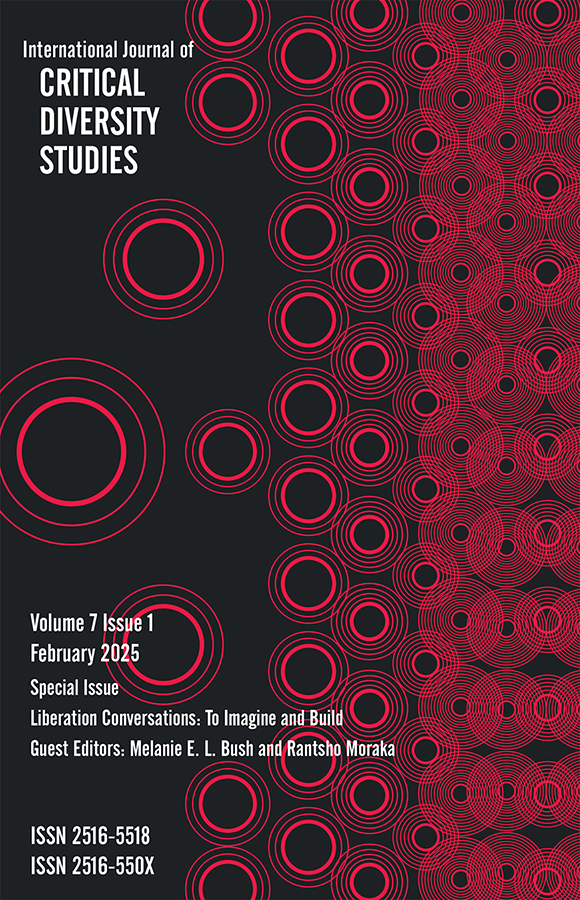
International Journal of Critical Diversity Studies
The International Journal of Critical Diversity Studies is a bi-annual, peer-reviewed journal that aims to provide a platform for critical engagement with hierarchies of power that create and sustain privilege and oppression along axes of difference. IJCDS contains original articles (research and theoretical) and book reviews and is published in June and November. All articles are submitted for anonymous peer reviewing by at least two referees.
Print ISSN: 2516-550X
Online ISSN: 2516-5518
International Journal of Critical Diversity Studies (IJCDS) launched in 2018 is administered by the Wits Centre for Diversity Studies (WiCDS) based in the Faculty of Humanities at the University of the Witwatersrand. WiCDS is an interdisciplinary initiative designed to produce cutting-edge knowledge which contributes towards the deepening of local and international; theoretical and practical understandings of diversity.
WiCDS was established in 2014 at the University of the Witwatersrand, Johannesburg. WiCDS aims to build capacity to meet the challenges of diverse societies, especially in post-apartheid South Africa through interdisciplinary postgraduate education and research. In addition to being grounded in social justice imperatives, WiCDS’s education, programmes and research are informed by Melissa Steyn’s (2007) notion of Critical Diversity Literacy (CDL) which is “a sharply focused critical lens which examines those operations of power which implicate social identities to create systems of privilege, advantage, disadvantage and oppression.”
International Journal of Critical Diversity Studies (IJCDS) aims to provide an undisciplinary platform for critical engagement with hierarchies of power that create and sustain privilege and oppression along axes of difference. Areas of interest include the constructions of social locations and positionalities; intersections, co-constructions and co-constitutions of systems of oppression; race; gender; sexuality; dis/ability; class; age etc.; the politics of knowledge production; the politics of being and affect; the politics of history and time; the politics of geography and location; reproduction and resistance social injustice; reframing differences. This journal will accept original articles (research and theoretical), commentaries and book reviews.
Editorial Team
Nicky Falkof, University of the Witwatersrand, Editor-in-chief
William Mpofu, University of the Witwatersrand, Book review editor
Esra Sarioğlu, University of Virginia, Editorial team
Scott Burnett, Pennsylvania State University, Editorial team
Tiffany Willoughby-Herard, University of California, Irvine, Editorial team
Rudo Mzite, University of the Witwatersrand, Editorial assistant
Editorial Board
Annika McPherson, University of Augsburg
Camila Andrade, Federal University of Paraíba (UFPB)
Garth Stevens, University of the Witwatersrand
Jolanta Drzewiecka, Washington State University
Katlego Disemelo, University of the Witwatersrand
Kirk Sides, University of Wisconsin-Madison
Lewis R. Gordon, University of Connecticut
Malose Langa, University of the Witwatersrand
Maria Soledad Falabella, University of Chile
Marla Jaksch, College of New Jersey
Melanie Bush, Adelphi University
Mörsch, Dr. Carmen, Johannes Gutenberg University Mainz
Nirmala Erevelles, University of Alabama
Pauline Leonard, University of Southampton
Peace Kiguwa, University of the Witwatersrand
Pumla Gqola, Nelson Mandela University
Robert McRuer, George Washington University
Sanja Nivesjö, Uppsala University
Sara Orning, University of Oslo
Sisanda Nkoala, University of the Western Cape
Tamara Shefer, University of the Western Cape
Ulla Klingovsky, University of Applied Sciences and Arts Northwestern Switzerland
Yianna Liatsos, University of Limerick
Advisory Board
Melissa Steyn, Founding Editor
Tommaso Milani
Srila Roy
Haley McEwen
Heather Dalmage
Mehita Iqani
Shelley Tremain
Boaventura de Sousa Santos
Jasbir Puar
Lydia Potts
Morgan Ndlovu
Ramόn Grosfoguel
Sabelo Gatsheni-Ndlov
France Winddance
Tom Nakayama
Instructions for Authors
Authors are required to adhere to specific guidelines when submitting manuscripts. For detailed instructions, please see IJCDS Instructions for Authors.
Instructions for Reviewers
Thank you for agreeing to review an article for IJCDS. Please see our Instructions for Reviewers.
Editorial Office:
International Journal of Critical Diversity Studies, Wits Centre for Diversity Studies (WiCDS), University of the Witwatersrand, Johannesburg,
South Africa,
Private Bag 3,
Wits,
2050,
Johannesburg,
South Africa.
Tel: +27 11 717 4418
Email: ijcds.wicds@wits.ac.za
Publisher Pluto Journals, evek@plutojournals.com
The Journal is a bi-annual, peer-reviewed journal published in June and December. The journal has been indexed on DOAJ since March 2023. For the purposes of preservation and restoration the PORTICO archiving system is used to create permanent archives for the journal. For more information on WiCDS visit the official website here.
The journal is Open Access and the Open Access statement, Open Access license terms, copyright terms as well as a statement on its absolute lack of author charges can be found here.
The journal became Open Access on 1 January 2021 and is published open access on ScienceOpen. All journal material published prior to 1 January 2021 is also published, Open Access on ScienceOpen here. This means the reuse rights of published material is all under the open CC BY 4.0 license as stated here. .
The journal adheres to the ethical standards endorsed by the Committee on Publication Ethics
(https://publicationethics.org/). In particular:
- We expect all authors to state in their article if they have a conflict of interest which could potentially
bias their opinions – for example funding or employment. - All named authors on the articles should confirm that they have jointly participated in the research and
writing of the article, and that no author has been omitted from the list of authors. - We require authors to warrant that their articles are original, have not been previously published, and do
not plagiarise or otherwise copy someone else’s work without attribution. (If the article is a translation,
we are happy to consider this for publication but the authors must inform the editors on submission. - We also require authors to warrant that their article does not defame, libel, or bring another person into
disrepute, and neither does it contain anything illegal (e.g. copyright infringing).
Trump in the Global South
Special issue of the International Journal of Critical Diversity Studies
Editors: Nicky Falkof, Iginio Gagliardone and Nkululeko Sibiya (University of the Witwatersrand, Johannesburg, South Africa)
Since his second arrival into office in 2025, Donald Trump has saturated news, social media and public debates well beyond US borders. Yet most scholarship on Trumpism remains US-centric. In this special issue of the International Journal of Critical Diversity Studies we ask how his political brand – populist nationalism, nativism, authoritarian tendencies, eugenic rhetoric and violent attacks on difference – resonates or clashes with political realities, historical experiences, social structures and cultural values in the Global South, parts of which he famously dismissed as ‘shithole countries’. We also ask how perspectives from the Global South allow a reading of Trump and Trumpism that goes beyond increasingly insular frameworks centred on the rise of the far right and threats to civil liberties in the US. With a focus on the first year of Trump’s second presidency, this special issue examines how his policies, and the divisive representations of race, gender, sexuality, disability and nationality that often underpin them, have been received and reported in the South. It invites empirical, critical analyses of how communities, political actors, religious groups, media and social movements in the Global South have interpreted, appropriated, resisted or supported Trump, his discourses and his political agenda.
Scope and key themes:
This special issue encourages contributions that critically explore, but are not limited to, the following themes:
Unexpected alliances and affinities: Where does support for Trump or Trumpism appear among communities in the Global South? How do we understand cases where such alignments may appear counter-intuitive?
Resistance and rejection: What forms of critique, resistance or satire targeting Trump and Trumpism emerge from the Global South? How significant are they in national public debates and how likely to influence national politics?
Enforcing identities: How do responses to Trump and Trumpism enforce resistant, traditional, dominant or minority identities in the Global South? How do these constituencies use their affective responses to Trump to further cement the meanings of their identities?
Mediated engagements and digital cultures: How do traditional and social media in Global South countries frame Trump, facilitate the spread of his ideas or foster communities of support/critique? How do local digital cultures engage with Trumpist discourse (memes, hashtags, influencer commentary)?
Contradictions and repercussions: How do Trump’s rhetoric and policies intersect with local realities? How do engagements with Trumpism exacerbate existing social fractures or create new ones? What are the tangible consequences of these trends?
We invite submissions from across the social sciences and humanities, including (but not limited to) critical diversity studies, sociology, political science, anthropology, international relations, media and communication studies, religious studies and gender studies. We strongly encourage interdisciplinary work and welcome a range of methodological approaches, from ethnography and discourse analysis to digital methods, computational social science and mixed-methods research.
We are particularly interested in contributions from scholars based in, or conducting research in, Africa, Latin America and Asia. We aim to create a platform for voices that are often marginalised in global academic discourse and to foster a dialogue that places the Global South at the center of critical analyses of global political phenomena.
Timeline and submission details
- Abstract submission deadline: November 15, 2025
- Notification of acceptance: December 15, 2025
- Full paper submission deadline: March 1, 2026
- Expected publication date: Late 2026
Extended abstracts (between 500 and 750 words) and a short bio (max 150 words) should be sent to nkululeko.sibiya@wits.ac.za.
Final papers should be between 6,000 and 10,000 words (including references) and will undergo a double-anonymous peer review process according to the journal’s guidelines. The International Journal of Critical Diversity Studies is published by Pluto Press. The journal is Gold Open Access and there are no article processing charges.


